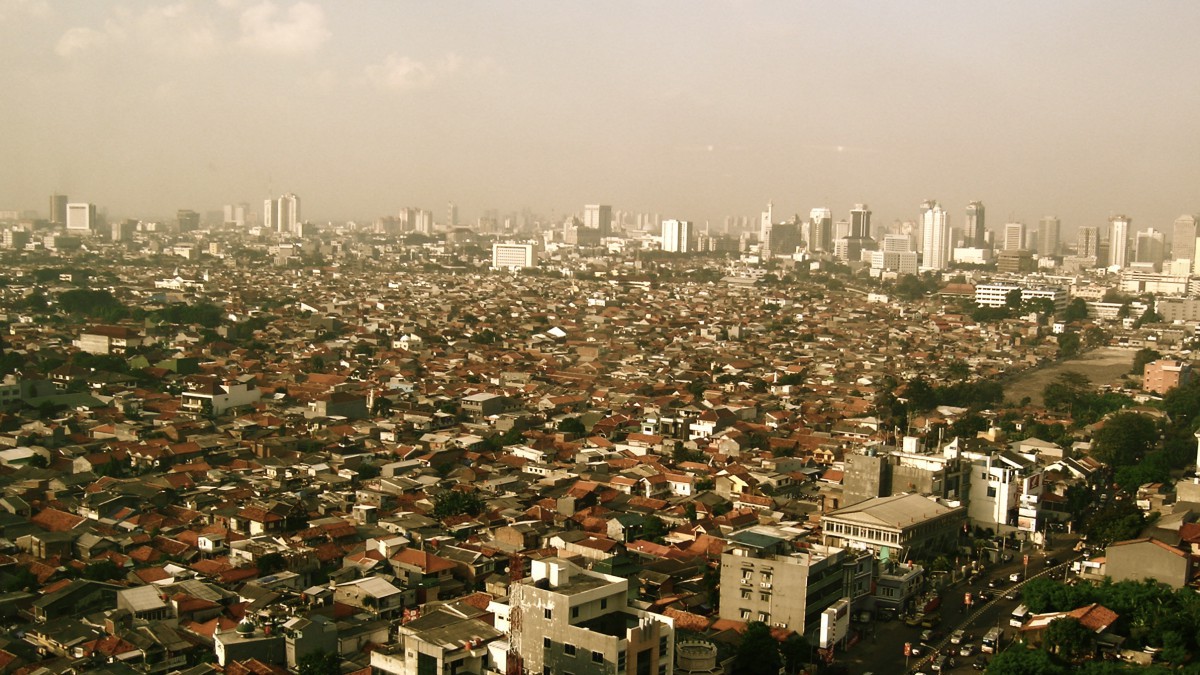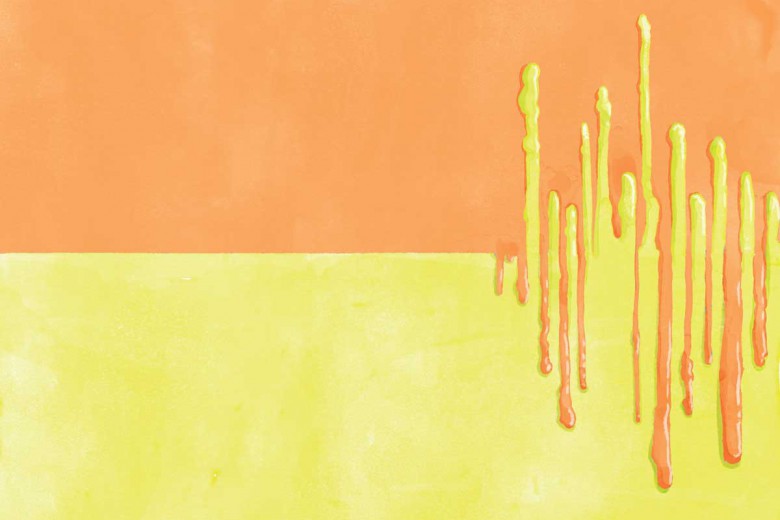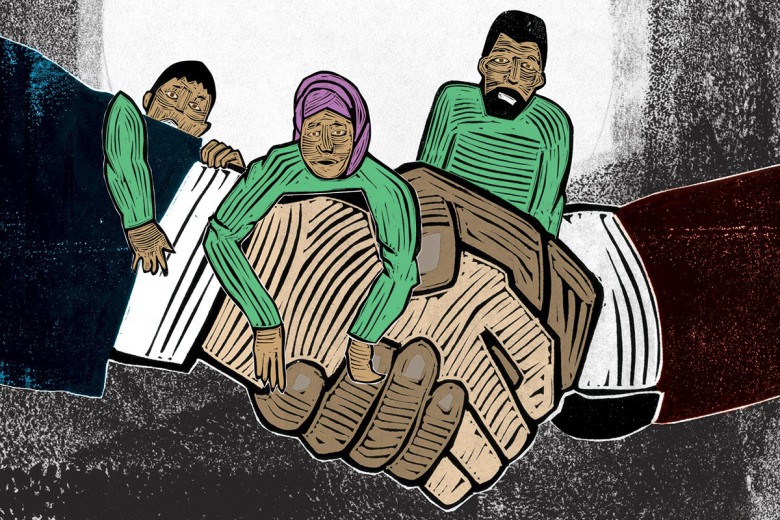1.
Every year, on my birthday, Mami sings to me, in Hakka, “Moi moi kin yen git tou soy, mai pun ngai oi eum moi?” Hakka, my mother’s tongue, is one of the many Chinese dialects in Kalimantan, where my mother’s family dropped anchor. The song’s literal translation is, “Little girl, little girl, how old are you this year, would you sell yourself to me?” But that’s not what she means.
We’re having breakfast in the kitchen of an apartment that doesn’t belong to us. A sliver of summer sun streams through the window. Sparrows chirp and flutter their wings on the fire escape. On the kitchen table are two cups of milk tea, and half-a-dozen egg tarts. Earlier that morning, Mami walked to the bakery on Queens Boulevard to pick them up. Mami wears a loose white blouse, paired with a floral scarf and cargo pants. I’m still in my pajamas, my hair like a bird’s nest. Growing up, I thought Mami wore her femininity like an albatross around her neck, conditioned to put other people’s needs before her own, seeking their approval, especially from men. Confucian misogyny or capitalist-patriarchy? Does it matter? Is patriarchy bound by borders? Growing up in a liberal society, I could afford to choose; I chose to surround myself with women and queer folks, not wanting to be subservient to anyone. I wanted to belong to no one but myself.
Mami removes the plastic lid from her milk tea, steam curling into the air. She sets it aside to cool. I bite into my first egg tart, flaky scalloped edges melting into the sweet custard. Mami lifts the paper cup to her mouth and asks, in Hakka, “When are you getting married?”
I know Mami wants me to marry a well-mannered U.S. citizen. By “well-mannered” she means: marry white, or at least Asian. It would be great if they come from a middle-class family, but that’s not as important because she believes in hard work and the American Dream. Two years ago, when I let slip that I’m also attracted to women, Mami held her tongue for two days, before giving in on the third. “A well-mannered U.S. citizen girl is okay too,” she amended.
Interpreting my silence as green light, she switches to English, “I worry about you. Don’t you want to solve your immigration problem?”
“A well-mannered U.S. citizen girl is okay too,” she amended.
What I want to say isn’t what she wants to hear, so I press my lips shut. Out of respect. Mami plunges on, “Is easy. You fall asleep you wake up and it’s five years. You get your papers. If you don’t want to stay just go, easy.”
Right, except that it took you almost nine years to get yours because your husband is an asshole with anger issues. Remember when things got so bad the neighbours ended up calling the cops on him?
I feel these words behind my teeth, so I reach into the paper bag for a second, then third egg tart. I can’t always tame my rebellious tongue but I can keep it busy. I chew on filo dough, sweet custard, pointed words, and swallow them all down. Better down than out.
“I just worry about you,” Mami repeats. “You don’t know how hard my life has been. You don’t know how much I’ve had to pray to bring us here.”
I’ve heard this story countless times, but I’ve been raised better than to interrupt her.
2.
Standing behind other non-U.S. citizens at JFK’s passport control, Mami and Cece, my older cousin, shifted from one foot to another, running their fingertips along the Pancasila crest of their passport sleeve, mentally rehearsing their answers. I was oblivious. At eleven, I preferred the world of fantasy and Hogwarts to the real world.
In the real world, it had only been 20 months since the September 11 attacks. Empire struck back, swift and unrelenting, racing the Four Horsemen of the Apocalypse to the Middle East. Domestically, the Bush administration established the Homeland Security State.
We settled in Flushing, Queens without the permission of either the Matinecock nation or the U.S. government. Main Street, then as it is now, overwhelms: a cacophony of car horns and languages. Buses move through Roosevelt Avenue, slow as molasses; people spill out of the sidewalk into the streets, trailing cigarette smoke. The smell of piss rises from subway grates, co-mingling with car exhaust and human sweat. Fruit vendors compete with one another, yelling in Mandarin, “Yi kuai, yi kuai!” The yelling attracts customers, and it doesn’t matter if they don’t understand it, because money is a universal language. Along the side streets, women in form-fitting dresses stand under the awnings of spas and massage parlours; men with hard hats wait for their next job. On Kissena Boulevard, Mormons proselytize in English while Falun Dafa videos loop in Mandarin, encouraging passerby to quit the Chinese Communist Party. In Flushing, everybody works, everybody speaks money.
Empire struck back, swift and unrelenting, racing the Four Horsemen of the Apocalypse to the Middle East.
The first time I overheard a conversation in Bahasa Indonesia was when we moved to Elmhurst. I recognized the lilt of the language, but not its meaning. When I told Mami this, she scoffed in Hakka, “Why you want to remember a useless language, I don’t understand. Study English instead.”
Working as a cashier in midtown Manhattan, land of the Lenape, Mami learned to deal with customers who raised their voices at her when the line cooks made a mistake. They would say, “Do–you–understand–English? This–is–not–what–I–ordered. I–want–my–money–back.”
Mami understands English well but in this world, the customer is always right. So she stills her tongue, opens the register, and counts the bills. When they leave, she’d spit out the curse she’d held in her throat. Better out than down.
Growing up, I saw Mami and Cece wield Mandarin, Cantonese, and imperfect English to negotiate rent and jobs. I navigated school bureaucracy and parent-teacher conferences in English and Hakka. At eleven, I understood that our situation made me different from my classmates. There would be no Hogwarts for me. There was only the real world, where headlines blared about the dangers of “illegal immigrants,” and we overheard whispers of another ICE raid at someone’s workplace. I could no longer relate to Harry. Instead, I sought refuge in darker stories, losing myself in the stacks of Flushing Library.
3.
I joke that I’ve been playing hide-and-seek with U.S. immigration since 2003. With the announcement of DACA in 2012, the game has shifted to legal limbo, purgatory, how low can you go? By now, the government knows where I’ve lived, where I’ve studied, where I’ve worked, who I’ve organized with, how much I make every year, what I post on social media. I continue to know nothing about them. They remain a faceless, ineffable entity, with whom I’m playing a high-stakes poker game in the backroom, and they are the dealer with a penchant for murder.
In 2011, Joaquin Luna, an undocumented student in Texas, committed suicide. He had dreams of becoming an architect or a civil engineer. He was 18 years old.
I joke that I’ve been playing hide-and-seek with U.S. immigration since 2003.
I thought about how I stood over the bathroom sink, holding my wrist under the faucet, running water numbing my skin, as I pushed my fingernails across my pulse over and over again, never breaking skin. I could’ve found a razor but I didn’t. This way, there would be no scars. Just criss-crossed welts that fade into tender skin.
I thought about how this happened three months after my 13th birthday, after I told Mami that I wanted to go back to my aunt’s in Kuala Lumpur, or to my dad’s in Jakarta, because I didn’t want to be here anymore.
4.
What I’ve been trying to say to Mami for the past several years, but which she refuses to hear, is this: I don’t want to be a U.S. citizen. Not anymore.
I wish I could point to a single “aha” moment – that would have made it easier to explain to Mami when she asks, “What has the U.S. government ever done to you? Did they hurt you personally?”
I wish I could explain, in Hakka, in Bahasa Indonesia – in any language but goddamnEnglish – all the minute moments of heartbreak, of historical rage that have accumulated like grains of sand threatening to burst the hourglass.
How do I explain to Mami that we thought we migrated, but in reality, we were displaced?
How do I explain to Mami that our lack of immigration status is not accidental, but by design? That it’s a byproduct of capitalism, that beast which devours resources and treats human lives as cheap, disposable objects, to lay down at the altar of limitless growth and decadence? How do I explain to Mami that it’s not her fault that she still can’t afford a place of her own, despite working 12-hour shifts for the past decade? How do I explain to Mami that the U.S. government supported Suharto’s rise to power, and his decision to cannibalize the country’s vast resources? That the poverty she endured in Kalimantan, and that I witnessed in Jakarta, was not God’s will, but designed by man? How do I explain to Mami that, yes, we were lucky to be able to leave Jakarta, but we shouldn’t have had to leave in the first place? How do I explain to Mami that, in the same way that she has learned not to trust the Indonesian government, I’ve learned not to trust the U.S. government?
How do I explain to Mami that we thought we migrated, but in reality, we were displaced?
I wish I could say this in any language but goddamnEnglish.
This article was the runner-up of the creative non-fiction category of our eighth annual Writing in the Margins contest. Creative non-fiction entries were judged by Alicia Elliott. We gratefully acknowledge the financial support of the Regina Public Interest Research Group (RPIRG) to this year’s contest. Briarpatch will be accepting entries for the ninth Writing in the Margins contest in September 2019.







